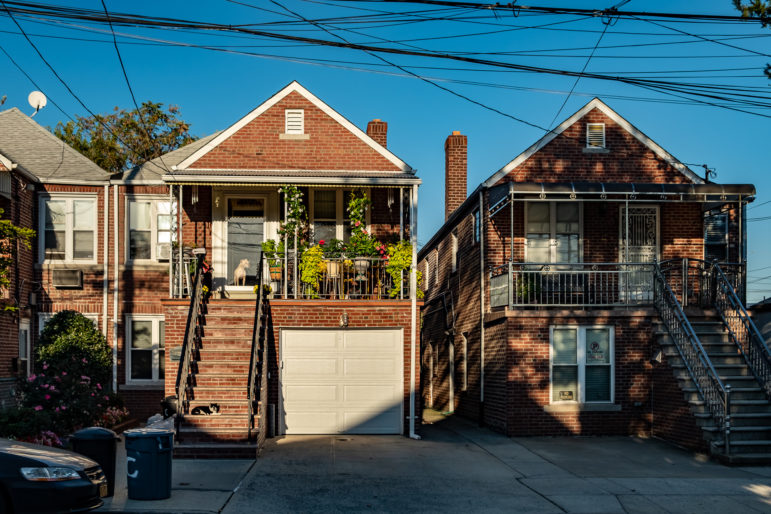Under current law, state and county prosecutors are bound by statutes of limitations and forced to rely on charges, like grand larceny, that do not take into account the magnitude of the crime, officials say.

Adi Talwar
Homes on Tomlinson Avenue in Morris Park, The Bronx.
Attorney General Letitia James’ office is calling on New York lawmakers to make “deed theft” an explicit crime in the state penal code to ease the prosecution of pernicious property thieves.
James’ top deputies discussed the deed theft proposal at a Senate hearing in Manhattan Thursday, where a host of lawyers and victims described the way fraudsters have used deception, forgery and tangled webs of shadow companies to steal homes and evict the rightful owners—overwhelmingly people of color in New York City’s gentrifying neighborhoods.
A “standalone crime of deed theft” would show real estate scammers that the state intends to hold them accountable, said Meghan Faux, the chief deputy attorney general for social justice.
The charge would be an “important signaling device to demonstrate the legislature’s intent that this conduct be treated criminally and not hope that prosecutorial creativity will suffice.”
Under current law, state and county prosecutors are bound by statutes of limitations and forced to rely on charges, like grand larceny, that do not take into account the magnitude of the crime, Faux said.
“Although property value is important, there are other factors, such as whether the home was the victim’s primary residence, whether the victim was a vulnerable person, which should decide the severity of the crime,” Faux said in a prepared testimony.
The Attorney General’s Office is currently investigating “dozens” of cases statewide, but does not have capacity to take on many more of the work-intensive probes, Faux said. The New York Times reported in July that the office was only prosecuting three cases.
Strengthening other existing laws, like revealing the owners behind opaque limited liability companies, will also help hold scammers accountable, officials said.
Rod Murphy, the chief of the attorney’s general’s Public Integrity Bureau and Real Estate Enforcement Unit, recommended bolstering rules for notaries—“the first line of defense with respect to combating deed theft”—by forcing them to compile more information from buyers when signing for property transfers. Murphy also urged the legislature to require courts to freeze evictions when there is a pending investigation or lawsuit alleging deed theft.
“Doing so not only limits the potential damage of deed theft, it also puts the homeowner in a better position to assert their rights and stay housed,” he said.
Deed theft is particularly prevalent in Brooklyn, where speculators who exploit owners in tough financial straits can flip homes for enormous profits. The Brooklyn District Attorney’s Office has indicted 27 deed fraud cases, some of which included multiple properties or defendants, since 2014. All have ended in a conviction or are still pending, according to office data.
Deed theft cases that feature forged documents provide a clear-cut example of fraud, but perpetrators often use more ambiguous practices, like misrepresentation or offering to settle an owners’ debts without following through. Many cases can be difficult to prove because the transfers involve multiple family members, because there is no paper trail or because some money was exchanged, said Brooklyn DA Eric Gonzalez.
“We comprehensively investigate every allegation we receive using every tool at our disposal, but in most cases, there is insufficient evidence to prove a crime,” Gonzalez said.

Adi Talwar
Attorney General Letitia James’ office is currently investigating “dozens” of deed theft cases statewide, but does not have capacity to take on many more of the work-intensive probes.
Gonzalez and James have coordinated on outreach to educate homeowners about how to identify and resist deed theft, aiming to raise awareness about common tactics by coercive speculators who use real estate records to identify victims.
Brooklyn accounted for about half of the city’s 3,350 deed theft complaints between July 2014 and February of this year, according to the city’s Department of Finance. The district attorneys from the other four boroughs did not provide a response when asked how many deed theft cases they have prosecuted.
But a small number of the complaints typically are, forcing New Yorkers to challenge the theft of their homes in civil court—an expensive, yearslong process where displaced residents face off against wealthy real estate pros. A Times investigation revealed the complicated techniques used by real estate lawyer Sanford Solny, who continued earning profits off buildings he is accused of stealing even as prosecutors in Brooklyn and Queens charged him with crimes across at least 17 buildings.
“The concept of deed theft to me seems pretty simple, but the execution is often incredibly complicated [with a] labyrinth of paperwork and LLCs,” said Brooklyn State Sen. Zellnor Myrie at the hearing.
Arthur Burkle, an attorney from Brooklyn Legal Services, urged lawmakers to increase funding to the Homeowner Protection Program (HOPP), formed by the attorney general’s office in 2012* to guarantee mortgage assistance to any New Yorker at risk of losing their homes. The program helps people modify loans and hold onto their homes with the help of trained, legitimate attorneys, Burkle said.
“[HOPP] is a crucial tool to preserving homeownership in Black and brown communities,” Burkle said. “Every year, that funding is in jeopardy. It should be a permanent part of the budget.”
Multiple people testified to describe their own experiences with deed theft at the hearing.
Attorney Yolande Nicholson, who represents New Yorkers suing to reclaim their homes, said the crime undercuts the main source of wealth generation for families of color, with consequences that ripple across generations.
“When a deed is stolen, with the deed goes that family’s primary or sole financial investment and asset, along with their memories, place of quiet enjoyment and security,” Nicholson said. “With the deed goes their good will in the community, their long-time friendships and familial relationships with neighbors; with the deed goes, some would say most importantly, their intergenerational wealth.”
Brooklyn resident Michael Baker said he inherited his father’s house but could not get a loan to pay off the property taxes, a water lien and needed renovations because of his poor credit score. He said he was tricked into signing over his deed in exchange for a loan and used the money to make repairs. But then the people in control of the deed evicted him.
“I put all the money into the house, but they kicked me out of there with no money,” Baker said. “Now I’m homeless with no one to answer to, nowhere to go.”
Attorney William Lienhard explained how his client, Janet Bruce, “fell prey to a foreclosure-rescue scam” run by Solny. When the Bruce family was facing foreclosure, a neighbor introduced them to Solny, who promised to pay them some cash along with their mortgage debt, Lienhard said. He then pressured them to sign documents without first reading them, including paperwork transferring the deed to his LLC. He never paid off their debt, and in fact compounded it while collecting rent from new tenants, Lienhard said.
New laws could help curb deed theft, Lienhard said, but “without aggressive legal enforcement, both civil and criminal, violating the law will continue to be just a cost of doing business for real estate fraudsters.”
*A previous version of this story misstated the first year of the HOPP program.









3 thoughts on “AG Urges New York Officials to Make ‘Deed Theft’ an Explicit Crime”
“The Attorney General’s Office is currently investigating “dozens” of cases statewide, but does not have capacity to take on many more of the work-intensive probes, Faux said. The New York Times reported in July that the office was only prosecuting three cases.”
They might have more time to prosecute serious cases like this if they weren’t so busy trying to uphold gun control laws that are clearly in violation of the recent U.S. Supreme Court decisions
I can’t believe anything the current District attorney says. There are ppl in his office who outright steal deeds too and when you go to report the Deed theft they make deals with the thieves especially of Hasidic Jewish affiliation. Most of the deed theft is being done by licensed NY state attorneys such as Sanford Solny (in my case) and Audrey Thomas who should be under a jail but are friends with the Brooklyn DA office.
I live at 14907 Oak Creek Blvd., Rosedale, NY 11422. I bought my house at the auction and my D+, which not want to put three times by a real estate agent that I trusted. I’m getting a rash bully and actually getting through out of my house. I reported over and over no one seems to helping with the situation.